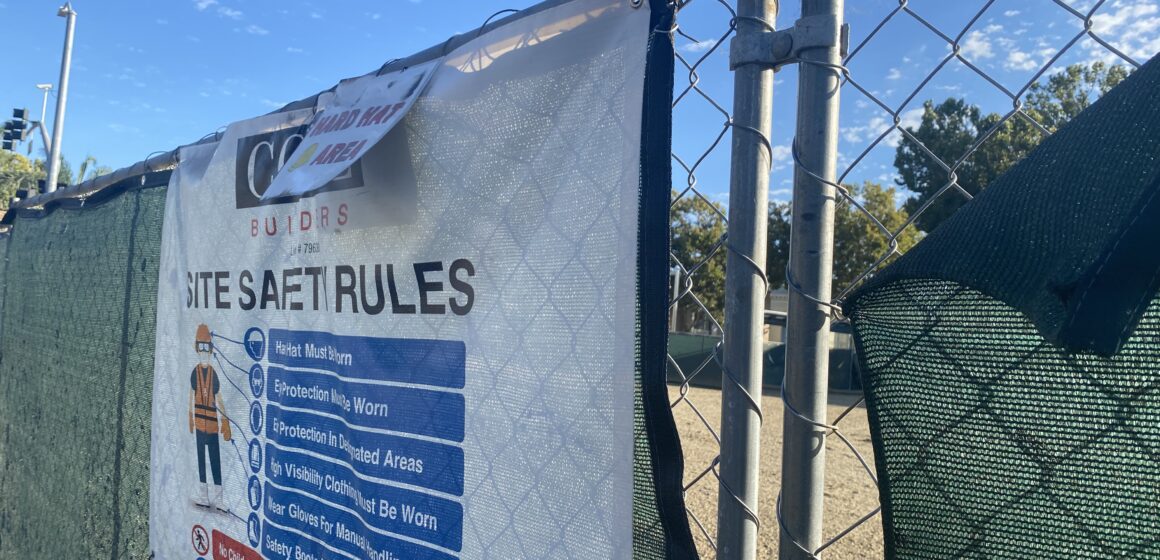Gov. Gavin Newsom has awarded three California communities millions of dollars for affordable housing — and Santa Clara County hit the jackpot.
The Algarve Apartments received $40 million in state Project Homekey+ funding to begin construction on the $79 million project in San Jose. When completed in October 2027, the development will provide 90 apartments for extremely low-income individuals, which will include 24 homes for veterans and 36 permanent supportive housing apartments for people experiencing homelessness. The funding is coming from Proposition 1, passed by voters last March.
Abode Housing Development, an arm of nonprofit Abode Services, is the developer of the project at 1135 E. Santa Clara St. next to Roosevelt Park. Chief Real Estate Officer Jon White said the project would not be able to start construction this year without funding from Homekey+. He said traditional funding sources for affordable housing like the Low-Income Housing Tax Credit have become extremely competitive.
“This project would not likely have secured a tax credit award for several years, which would have resulted in increased project cost because of inflation, tariffs and other escalating costs,” White told San José Spotlight.
Project Homekey+ provided just over 50% of the public funds. Other funding sources include $3 million from the California Department of Toxic Substance Control to clean up pollution from a dry cleaner that used to be on the site, White said. Santa Clara County provided nearly $36 million, including $22 million in Measure A money, a $950 million bond passed by voters in 2016 to build affordable housing.
Measure A has helped fund 57 affordable housing developments across the county, resulting in more than 5,000 apartments for formerly homeless residents or low-income earners.
Kathryn Kaminski, acting director of the Santa Clara County Office of Supportive Housing, said this will help some of the county’s most vulnerable residents.
“Systemic factors driving homelessness, such as housing affordability and cost of living, are stronger than ever, and addressing the homelessness crisis remains a top priority for the county,” Kaminski told San José Spotlight.
Project Homekey+ launched in September 2024 and sets aside $2.2 billion to house homeless veterans and people with behavioral health or substance use issues.
“A large portion of this Homekey+ funding is focused on providing the construction funding and ongoing operating support for veterans as well, so it paired very well with this development that will provide a safe and dignified home for 24 veteran households,” White said.
This most recent iteration builds upon the state’s Homekey program launched at the beginning of the pandemic, which gives localities money to build or convert commercial properties, hotels, adult residential facilities and more into permanent or temporary housing for people experiencing homelessness. San Jose has received about $121 million through Project Homekey for five projects: Arena Hotel, the former SureStay motel, Sunrise Pavilion, Pacific Motor Inn and the Branham Lane multistory modular village.
In a city ranked as the most expensive place to buy and rent, households need an annual income of $125,280 to afford a two-bedroom apartment in the county. Affordable housing is more dire than ever to prevent homelessness, Sandy Perry, vice board president of the South Bay Community Land Trust, said.
“There’s no question that it’s the solution to homelessness,” Perry told San José Spotlight.
Perry said he supports how Abode divided up the number of apartments to include a mix of those homeless people who will need supportive services and those who are extremely low-income.
“I think it’s going to be much better if you have 50% (of people there who need permanent supportive housing), because people are integrated in a larger community,” he said. “There’s not such a high concentration of mental health problems and/or substance abuse problems.”
 There are 6,503 homeless residents in San Jose, with roughly 3,959 people who are unsheltered. The city has doubled down on sweeping homeless encampments and banning RVs from designated streets. Mayor Matt Mahan has focused on building temporary housing as part of his strategy to end homelessness — but homelessness has still ticked up by 237 people since 2023.
There are 6,503 homeless residents in San Jose, with roughly 3,959 people who are unsheltered. The city has doubled down on sweeping homeless encampments and banning RVs from designated streets. Mayor Matt Mahan has focused on building temporary housing as part of his strategy to end homelessness — but homelessness has still ticked up by 237 people since 2023.
As San Jose disbands its largest homeless encampment in Columbus Park and moves hundreds of people there into temporary housing, Perry said those residents will eventually need a permanent place to live.
“It doesn’t end homelessness if permanent housing is not available,” Perry said.
Contact Joyce Chu at [email protected] or @joyce_speaks on X.



Leave a Reply
You must be logged in to post a comment.